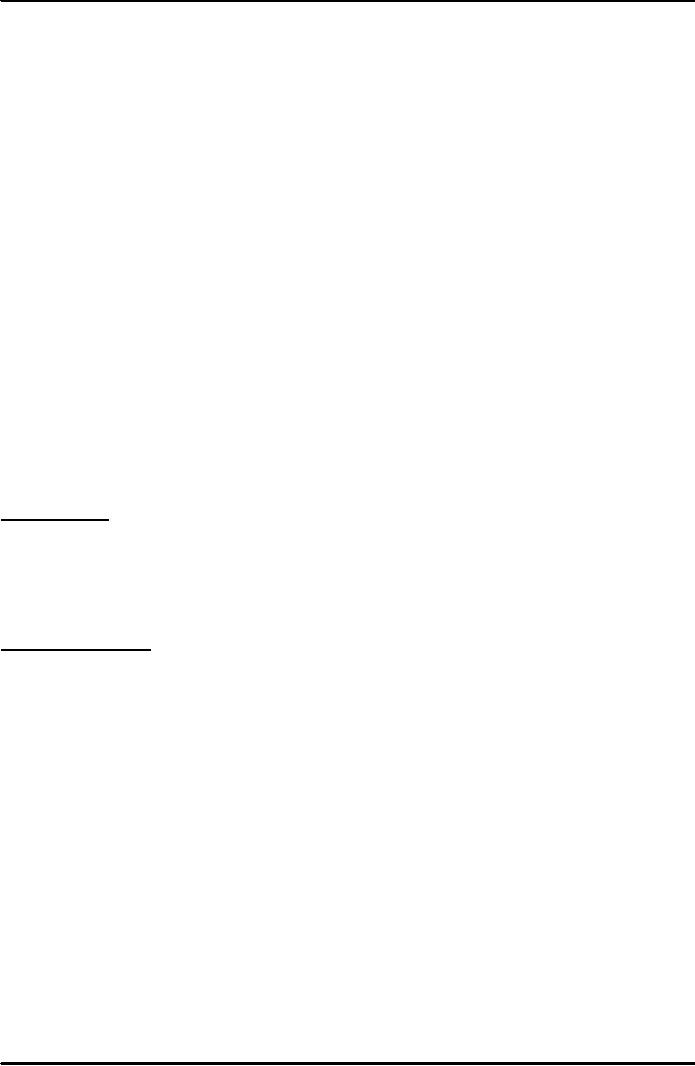 |
THESIS WRITING AND PRESENTATION:Write down your ideas |
| << NEGOTIATION AND LISTENING:Gather information that helps you |
| THESIS WRITING AND PRESENTATION:Sections of a Thesis (Format) >> |

VU
Lesson
42
THESIS
WRITING AND PRESENTATION
Writing
and Presenting Your Thesis or
Dissertation
�
Thinking
About It
�
Preparing
the Proposal
�
Conducting
the Research
�
Writing
the Research
Paper
�
Define
research
�
Discuss
basic elements of a research
paper
�
Sharing
the Research Outcomes with
Others
�
Revising
the Research
Paper
Thinking
about it
The
"thinking
about it stage" is when
you are finally faced
with the reality of completing your
degree.
Usually
the early phases of a graduate program
proceed in clear and very
structured ways. The
beginning
phases
of a graduate program proceed in much the
same manner as an undergraduate
degree program.
There
are clear requirements and
expectations, and the graduate
student moves along, step by
step, getting
ever
closer to the completion of the program.
One day, however, the clear structure
begins to diminish
and
now
you're approaching the thesis/dissertation stage. This is a
new and different time.
These next steps
are
more
and more defined by
you
and
not your adviser, the
program, or the department.
Thinking
about it
Be
inclusive with your
thinking.
Don't
try to eliminate ideas too
quickly.
Build
on your ideas and see how
many different research
projects you can
identify.
Try
and be creative.
Write
down your ideas.
This
will allow you to revisit an
idea later on.
Or,
you can modify and
change an idea.
write
your ideas they tend to be in a
continual state of
change
Good
feeling to sit down and scan
the many ideas
Try
not to be overly influenced at this time
by what you feel others
expect from you (your
colleagues,
your profession, your
academic department, etc.).
�
You
have a much better chance of
selecting a topic that will
be really of interest to you if it is
your
topic.
.
Don't
begin your thinking by assuming that your
research will draw international
attention to you!!
Instead,
be realistic in setting your
goal.
�
Make
sure your expectations are
tempered by:
�
...
the realization that you are
fulfilling an academic
requirement,
Be
realistic about the time
that you're willing to
commit to your research project.
If
it's a 10 year
project
that you're thinking about admit
it
�
Create
a draft of a timeline. the next
item)
�
put
a start and a finish time
for each.
�
Post
your timeline in a conspicuous
place (above your computer
monitor?) so that it
continually
reminds
you how you're doing.
�
Periodically
update your timeline with
new dates as needed.
�
If
you're going to ask for a
leave of absence from your
job while you're working on
your research
this
isn't a good time to do it. Chances
are you can do the "thinking
about it" stage without a
leave of
absence.
195

VU
�
Assuming
that there are six major
phases that you will
have during your research
project, probably
the
best time to get the
most from a leave of absence
is during the fourth stage* - the
writing stage.
�
This
is the time when you really
need to be thinking well. To be able to
work at your writing
in
large
blocks of time without interruptions is
something really
important.
�
It
can be most helpful at this
early stage to try a very
small
preliminary research study to
test out
some
of your ideas to help you
gain further confidence in what
you'd like to do.
�
The
study can be as simple as conducting
half a dozen informal interviews
with no attempt to
document
what is said. The key is
that it will give you a
chance to get closer to your
research and to test
out
whether
or not you really are
interested in the topic.
�
And,
you can do it before you
have committed yourself to doing
something you may not
like. Take
your
time and try it
first.
PREPARING
THE PROPOSAL
Assuming
you've done a good job of "thinking
about" your research project, you're
ready to actually
prepare
the proposal. A word of caution - those
students who tend to have a
problem in coming up with a
viable
proposal often are the ones
that have tried to rush
through the "thinking about
it" part and move
too
quickly
to trying to write the proposal. Here's a
final check. Do each of
these statements describe
you? If
they
do you're ready to prepare your
research proposal.
I
am familiar
with
other research that has
been conducted in areas
related to my research project.
Read
through someone else's research
proposal. Very
often a real stumbling block is
that we don't have
an
image in our mind of what the
finished research proposal should look
like.
�
How
has the other proposal been
organized?
�
What
are the headings that have
been used?
�
Does
the other proposal seem
clear?
�
Does
it seem to suggest that the
writer knows the subject
area? Can I model my proposal after
one
of
the
ones
that I've seen? If you
can't readily find a proposal or two to
look at, ask your
adviser to see
some.
Make
sure your proposal has a
comprehensive
review of the literature included.
Now this idea, at
first
thought,
may not seem to make
sense. I have heard many
students tell me that "This
is only the proposal.
I'll
do a complete literature search for the
dissertation. I don't want to waste the
time now." But, this is the
time
to do it. The rationale behind the
literature review consists of an argument
with two lines of analysis:
1)
this
research is needed, and 2) the
methodology I have chosen is
most appropriate for the question that
is
being
asked. Now, why would
you want to wait? Now is the time to
get informed and to learn
from others
who
have preceded you! If you
wait until you are
writing the dissertation it is too
late. You've got to do
it
some
time so you might as well
get on with it and do it
now. Plus, you will
probably want to add to the
literature
review when you're writing the final
dissertation
What
is a proposal anyway? A
good proposal should consist
of the first three chapters
of the
dissertation.
It should begin
with a statement of the
problem/background information (typically
Chapter I
of
the dissertation), then move on to a review of the
literature (Chapter 2), and
conclude with a defining
of
the
research methodology (Chapter
3).
Of
course, it should be written in a future
tense since it is a proposal. To turn a
good proposal into the
first
three chapters of the dissertation
consists of changing the tense
from future tense to past
tense (from
"This
is what I would like to do" to
"This is what I did") and making
any changes based on the way
you
actually
carried out the research
when compared to how you
proposed to do it. Often the intentions
we
state
in our proposal turn out
different in reality and we then
have to make appropriate editorial
changes to
move
it from proposal to dissertation
Focus
your research very specifically. Don't
try to have your research
cover too broad an area.
Now
you
may think that this will
distort what you want to do.
This may be the case, but
you will be able to do
the
project
if it is narrowly defined. Usually a broadly
defined project is not
do-able.
196

VU
�
Often
the researcher finds that what
he/she originally thought to be a
good research project
turns
out
to really be a group
of
research projects.
�
Do
one project for your
dissertation and save the
other projects for later in
your career.
�
Don't
try to solve all of the
problems in this one research
project.
Include
a title on your proposal.
�
how
often the title is left for
the end of the student's writing
and then somehow forgotten
when the
proposal
is prepared for the
committee.
�
A
good proposal has a good
title and it is the first
thing to help the reader begin to
understand the
nature
of your work. Use it
wisely!
�
Work
on your title early in the
process and revisit it often.
It's easy for a reader to
identify those
proposals
where the title has been
focused upon by the
student.
�
Preparing
a good title means:
�
...having
the most important words
appear toward the beginning of
your title,
What
is Research
The
word research is used in
different field in different
senses
If
you are a beginner researcher,
you are facing the same
problem whether you are preparing a
small
project
,an MBA dissertation or a Ph.D
theses. You need to select a
topic, identify the objectives of
your
study
plan and design a suitable
methodology, devise research instrument,
negotiate access to
institutions
material
and people, collect,
analysis and present
information and finally, provides a
well-written repot or
dissertation.
We
all learn how to do research
by actually doing it but a
great deal of time
Can
be wasted and goodwill
dissipated by inadequate preparation. But
before we discuss further it
better
to
define the term research. Different
people define it differently. For
example;
A
formal document
Knowing
a subject thoroughly
Expression
of ones undertaking About the
topic
Result
of ones intellectual curiosity
Analysis
and syntheses of different
resources
Reasonable
bias free conclusion
Howard
and Sharp(1983)
Seeking
through methodical processes to add to
one's own body of knowing
and hopefully, to that
of
other
, by discovery of non-trivial facts
and insight.
Drew
(1980)
Research
is conducted to solve problems
and expand knowledge. Research is a
systematic way of
asking
questions,
a systematic method of enquiry
We
find the word research being
used in two senses
1
the outcome of research is the
establishment, publicizing or utilization
of something that
somebody-
not
the researcher or the person
commissioning it- already
knows.
2the
outcome of knowledge that nobody
had before.
The
word research is used in
different field in one or
other of these senses and in
some fields in both
senses
Fiction
For
many novelists It is essential to
prepare for their writing by
researching the background in
which
they
wish to set their narrative
for accuracy of description, sensitivity to
atmosphere, history of the period
in
which
their fiction takes place
and authenticity of the language.
The final criterion for them
is the
authenticity
and artistic conviction of the final
product in their reader's
eyes. Research in this sense
may take
many
forms, and involve considerable
expense in terms of effort, time,
and money: but the
originality of the
novel
does not lie in the research
but in the artistic creation for
which it provides a background.
Journalism
For
journalist, especially in investigative journalism,
long periods of time are
spent researching
their
stories
to uncover facts and secrets
which their editorial policy
judges to be in the public interest,
and in
197

VU
cross-checking
what they are told or discover to
establish its truth. This is
not usually new truth,
but
information
otherwise not public or deliberately
withheld by another person. For
them, the final criterion
of
truth
may be bound up with
legalities: the law of libel
and slander, or the Official
Secret Act.
Police
work
For
the police, there is an obvious parallel
between preparing case against a
suspect by detective
work
and
research in this first sense: the
criminal they seek has a secret
which the police are bound to
uncover.
Here
again the criterion of
validity of the research is circumscribed
by the law: laws of
evidence,
police
procedure, protection of the
rights of the innocent, the
criminal and the victim. However,
it
is
interesting that
in this connection the language prefers the term
`detection' or `investigation' to research.
In
the commercial world, much
money is invested in product development
and even sponsorship
of
basic
research, and here one is
referring to the second sense as
described above. However,
research is also
conducted
into the people who will but
the products: market research.
Market research is used to
establish
what
can be sold who will
buy it, how a product
can be packaged,
advertised
Business
and commerce
In
the commercial world, much
money is invested in product development
and even sponsorship
of
basic
research, and here one is
referring to the second sense as
described above. However,
research is also
conducted
into the people who will but
the products: market research.
Market research is used to
establish
what
can be sold who will
buy it, how a product
can be packaged, advertised priced to
make it commercially
attractive,
and, linked to advertising campaigns,
even to create market to
persuade people to buy
something
they did not know they
wanted. The final criterion
for research in this field is
not therefore
simply
truth the description of a market situation
and the authentic expression of
that truth, but also
the
success
of an intervention or manipulation of the
market measured usually in
profit terms.
Some
obvious examples of research in the
second sense are the
following:
Medical
research
This
is research in the second sense: to
find out things nobody knew before.
The final criterion is
the
discovery
of new truths, but also the translation
of the new truths into
practical treatments, and
the
developments
of economies of scale so that the
treatment is available for the largest
number of people.
Here
ethical considerations receive a
great deal of attention,
both in terms of the human
patients and the
animals
which are used for
trials.
Science
and technology
Everyone
naturally associates research with
science and technology, white
coats and laboratories, but
is
should
be remembered in this context that
advances in the sciences are
not restricted to the discovery
of
new
facts: advances in theory development
and in research methods and
approaches occur in parallel. It
is
of
course a commonplace, though
nevertheless important, to highlight the
ethics of the development of
scientific
knowledge, both in the process of gathering the
knowledge and in the fields of
application
Sections
of a Thesis (Format)
The
following are sections that
most theses should contain
Introduction
This
section is an introduction to the topic
and the subject. It describes the
background to the research,
particularly
the major ideas (or theoretical
perspective) from which the
research is derived. The
introduction
explains
the reasons for doing the
research, and indicates why
the research is important valuable
or
significant.
It outlines the contribution that the
research will make to knowledge.
The introduction also
outlines
the aims of the research by presenting
research questions or
hypotheses.
Be
sure to include in the introduction a
clear statement of your
hypothesis and how you
are going to
address
it Throughout the introduction you should
use citations from the research
literature to support your
study.
These citations should include but not be
limited to research presented in the
Literature � Review.
The
following are suggested
topics that are usually
covered in the introduction.
Statement
of the Problem.
198

VU
You
should clearly state the problem
that your thesis is going to
address. You should also
present
relevant
information about why this is an
important problem. Describe what
precisely you intend
to
show/argue
and why (i.e., address the
ever-lurking "So What?" question). Is
your research problem
addressing
a significant social problem, or is it testing
some theoretical hypothesis, such as the
Marxist
argument
that high television viewing
levels make people feel apolitical
and powerless.
The
issues raised ideally are
timely, relevant to the problems or
trends of the present time, and
have
broad
applicability. Good questions
are those allowing theories
to be tested or, as when two
theories make
opposing
predictions, be compared.
In
this section you should first
grab the attention and
interest of your readers;
and secondly
introduce
the
problem to be studied. All
assertions of feet must be documented. Be
careful of any generalizations
that
you
make. A social science
research paper is not an
editorial
Statement
of the Problem.
In
this section you should first
grab the attention and
interest of your readers;
and secondly
introduce
the
problem to be studied. All
assertions of feet must be documented. Be
careful of any generalizations
that
you
make. A social science
research paper is not an
editorial
Background
and Need. You
should present relevant literature that
supports the need for
your
project.
Research articles, books, educational
and government statistics are
just a few sources that should
be
used
here. This section can
include brief overviews of articles
covered in the literature review that
support
the
need for your
project.
Rationale
The
rationale should define the larger problem being
investigated, summarize what is
known
about
the problem, define the gap(s) in the
knowledge, and state what needs to be
done to address the
gap(s).
Purpose
of the Project Based
on the above background information, explain the
purpose of the study.
Explain
what you hope the study will
accomplish and why you
chose to do this particular study. This
should
be
supported with citations and specific
information related to the study,
Research
Questions/Hypotheses. Given
the background above, you carefully state
the hypothesis
(ses)
that will be tested in your
thesis.
The
hypothesis is the central question being
researched. It should be expressed in
straight-forward
terms.
A good hypothesis is comparative,
measurable, and falsifiable.
Hypotheses
are usually defined in
"cause -effect" relationships.
Any corollary hypotheses or
secondary
research
questions should also be stated.
Any supplemental definitions or
discussion necessary to explain
the
hypothesis should be offered.
Underlying
every theory is the issue of
causality. What exactly does it
mean to say that
poverty
"causes"
crime, that cultural materialism "causes"
moral decay, or that religiosity
"causes*1 one's
euthanasia
attitudes? Just because two
events historically occur simultaneously
does not
necessarily
mean that one is influencing
the other.
Limitations,
Provide a background
for any limitations to this study. Be
very specific for example
the
population
to which your findings will be
limited.
Follow
these
guidelines while searching
for a subject 4 topic
v
Understand the distinction between the
subject and a topic that
can help you to plan your
research
paper
effectively.
v
Within a broader research subject
decide about the topic that
is more focused and worth
an
investigation.
v
Consider your subject or
topic and answer the
questions who, what, when,
where, why, and
how.
v
Draw a short and possible
list of topics and settle
for the one that interests
you and is worth
investigating.
v
Explore your own understanding of
the topic, as there's always a
temptation to select a topic
before
a
thorough ground work, resist
the temptation.
199

VU
Be
sure that the topic meets
the requirements of your research
assignment, audience's needs,
and
expectations
v
Avoid dead end topics
those unsuitable for your
interest or resources.
v
Avoid scattered, superficial
research topics.
v
Avoid topics that are
too beaten and narrow
and has nothing new to
offer.
v
Pick a topic that
shows your
individuality,
ability
and interests.
v
Continue refining and
narrowing it to make it significantly
specific
v
ensure
that there: are sufficient
resources available on your
selected topic because
without a
worthwhile
literature
REVIEW
THE THESIS WILL BE
WORTHLESS.
v
v Ail research projects begin
with the statement of
hypothesis.
v
Hypothesis is a guide or a sign
post to the researcher that
keeps one on the
track.
v
The researcher tests the
initial presupposition or hypothesis as works
along.
v
Hypothesis
is formulated in such a way
that it enables the researcher to
test
it.
v
Hypothesis depicts and describes
the method that follows during the
study.
v
Hypothesis is; a kind of hunch that
the researcher has about the
topic.
v
Hypothesis establishes the precise
focus of the research study.
v
Hypothesis helps decide the aims
and objectives of the study.
v
Hypothesis
is of speculative nature, an imaginative preconception
of "what might be
true".
v
Hypothesis is a welt established
research question that can be in
form of a descriptive statement or
a
question.
v
v The thesis statement is
usually considered the most
important sentence and the
main point of your
essay/
report or research paper
because it out lines the
central purpose of your
essay.
A
thesis, statement is one of the
greatest unifying aspects of a paper. It
should act as mortar,
holding
together
the various bricks of a paper,
summarizing the main point of the
paper "in a nutshell" and
heralds
the
development of the paper.
A
thesis statement is what you'll
PROVE, it is the ARGUMENT. If is the
SCOPE,
it is the
MAIN
IDEA
and
the PURPOSE
of
your paper and that
you intend to develop, prove, defend or
explore with
evidence
and therefore has an argumentative or
informational edge and must
not state the obvious.
A
thesis statement is a sentence
that clearly and concisely
indicates the
Subject
of your paper, the main
points you will discuss,
and the order in which you
will discuss them.
v
v A thesis statement
establishes the writer's point of view,
set the, stage or mood of the
paper and
prepare,
the readers what to expect.
A
thesis statement is important
for the writer, because it
gives the structure to the paper
and .is equally
important
for the readers, because it
guides them as what to expect.
It
is precise. It is not something
that one has trouble
understanding and should be specific enough
to
give
your reader a clear sense of
what your entire essay is going to
discuss.
It
should not be too general or so
specific, that it fails to
represent any strong
position
Often,
the thesis is stated clearly in
one or two sentences at the
end of, the essay's
introduction. There
are
exceptions to almost every rule of
writing, including this one.
Ideally, the position of the
thesis
statement
needs to be at the end of the
introductory paragraph so that
readers know the topic of the
papers.
Examples
of General to Specific Thesis
Statements:
Notice
the transition...from General to
Specific
Men
and women are
different.
Men
and women communicate
differently.
Men
and women communicate
differently. Men tend to
focus on the literal aspect of what is
being said
in
a conversation, women often "read
between the lines* and focus
more on intonation and body
language.
v
v Men and women
communicate differently. Whereas
men tend to focus on the
literal aspect of
what
is being said in a conversation, women
often "read between the lines"
and focus more on
intonation
and
body language; this phenomenon may
significantly contribute to the high divorce
rate among many
couples.
Hawthorn
discusses evilness in Young
Goodman Brown.
In
Young Goodman Brown,
Hawthorn discusses evilness
through symbols.
In
Young Goodman Brown,
Hawthorn uses light and
darkness to emphasize good
and evil in the world
200
Table of Contents:
- COMMUNICATION:Definition of Communication, Communication & Global Market
- FLOW OF COMMUNICATION:Internal Communication, External Communication
- THEORIES OF COMMUNICATION:Electronic Theory, Rhetorical Theory
- THE PROCESS OF COMMUNICATION & MISCOMMUNICATION:Message
- BARRIERS IN EFFECTIVE COMMUNICATION /COMMUNICATION FALLOFF
- NON- VERBAL COMMUNICATION:Analysing Nonverbal Communication
- NON- VERBAL COMMUNICATION:Environmental Factors
- TRAITS OF GOOD COMMUNICATORS:Careful Creation of the Message
- PRINCIPLES OF BUSINESS COMMUNICATION:Clarity
- CORRECTNESS:Conciseness, Conciseness Checklist, Correct words
- CONSIDERATION:Completeness
- INTERCULTURAL COMMUNICATION
- INTERCULTURAL COMMUNICATION:Education, Law and Regulations, Economics
- INDIVIDUAL CULTURAL VARIABLES:Acceptable Dress, Manners
- PROCESS OF PREPARING EFFECTIVE BUSINESS MESSAGES
- Composing the Messages:THE APPEARANCE AND DESIGN OF BUSINESS MESSAGES
- THE APPEARANCE AND DESIGN OF BUSINESS MESSAGES:Punctuation Styles
- COMMUNICATING THROUGH TECHNOLOGY:Email Etiquette, Electronic Media
- BASIC ORGANIZATIONAL PLANS:Writing Goodwill Letters
- LETTER WRITING:Direct Requests, Inquiries and General Requests
- LETTER WRITING:Replies to Inquiries, Model Letters
- LETTER WRITING:Placing Orders, Give the Information in a Clear Format
- LETTER WRITING:Claim and Adjustment Requests, Warm, Courteous Close
- LETTER WRITING:When The Buyer Is At Fault, Writing Credit Letters
- LETTER WRITING:Collection Letters, Collection Letter Series
- LETTER WRITING:Sales Letters, Know your Buyer, Prepare a List of Buyers
- MEMORANDUM & CIRCULAR:Purpose of Memo, Tone of Memorandums
- MINUTES OF THE MEETING:Committee Members’ Roles, Producing the Minutes
- BUSINESS REPORTS:A Model Report, Definition, Purpose of report
- BUSINESS REPORTS:Main Features of the Report, INTRODUCTION
- BUSINESS REPORTS:Prefatory Parts, Place of Title Page Items
- MARKET REPORTS:Classification of Markets, Wholesale Market
- JOB SEARCH AND EMPLOYMENT:Planning Your Career
- RESUME WRITING:The Chronological Resume, The Combination Resume
- RESUME & APPLICATION LETTER:Personal Details, Two Types of Job Letters
- JOB INQUIRY LETTER AND INTERVIEW:Understanding the Interview Process
- PROCESS OF PREPARING THE INTERVIEW:Planning for a Successful Interview
- ORAL PRESENTATION:Planning Oral Presentation, To Motivate
- ORAL PRESENTATION:Overcoming anxiety, Body Language
- LANGUAGE PRACTICE AND NEGOTIATION SKILLS:Psychological barriers
- NEGOTIATION AND LISTENING:Gather information that helps you
- THESIS WRITING AND PRESENTATION:Write down your ideas
- THESIS WRITING AND PRESENTATION:Sections of a Thesis (Format)
- RESEARCH METHODOLOGY:Studies Primarily Qualitative in Nature
- RESEARCH METHODOLOGY:Basic Rules, Basic Form, Basic Format for Books